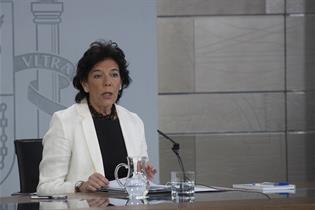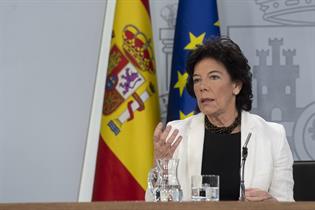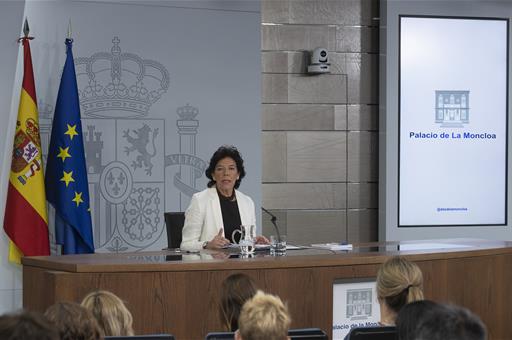Council of Ministers
Government approves purchase of food for those people most in need for sum of 87 million euros
Council of Ministers - 2019.7.19
The Acting Minister for Education and Vocational Training and Government Spokespersons, Isabel Celaá, reported on the agreement reached by the Council of Ministers that authorises the independent body the Spanish Agricultural Guarantee Fund (Spanish acronym: FEGA) to purchase food supplies for the Food Aid Programme 2020 to help those most in need, for the sum of 86.8 million euros.
The food to be purchased comprises basic, nutritional products that are the least perishable and can be transported and stored simply and that can be easily prepared to provide complete meals. These include white rice, cooked beans, tinned tuna, sardines and meat (lean pork), pasta products such as macaroni, canned tomato paste, biscuits, canned mixed vegetables, canned fruit in light syrup, jars of baby food (fruit and chicken), full-fat UHT milk, chocolate milkshake powder and olive oil.
It will be distributed by associate organisations in three phases, two next year and the third in the first quarter of 2021.
A total of 1.3 million people in our country receive food subsidies under this programme each year, 85% financed by the Fund for European Aid to the Most Deprived (FEAD), with the remaining 15% from the National Budget.
Subsidies to adapt communal aerials
 Pool Moncloa/Borja Puig de la BellacasaThe government has authorised a call for proposals for subsidies, for the sum of 145 million euros, so that residents' associations affected by the change of frequency of Digital Terrestrial Television (DTT) can adapt their communal aerials.
Pool Moncloa/Borja Puig de la BellacasaThe government has authorised a call for proposals for subsidies, for the sum of 145 million euros, so that residents' associations affected by the change of frequency of Digital Terrestrial Television (DTT) can adapt their communal aerials.
Isabel Celaá recalled that the government agreed, on 21 June, to free up the frequencies of the 700 MHz band of the radio-electric spectrum by 30 June 2020, partially held by DTT channels to allow the development of 5G mobile telecommunications networks.
This measure will affect some 850,000 residents' associations and 21 million inhabitants. The amounts of the subsidy will range from between 104.30 and 677.95 euros, depending on the previous infrastructure.
The Ministry of Economy and Business announced that the change of DTT frequencies will commence on 24 July in Majorca, Ibiza, Formentera and 94 municipalities in the province of Caceres. Some 36,000 buildings in these areas will be the first to have to adapt their communal aerials to continue receiving all the DTT channels.
Improved humanitarian aid system for asylum-seekers
The Council of Ministers approved new rules for the direct granting of subsidies to entities and organisations that perform actions to provide humanitarian aid to immigrants to extend this to those seeking international protection and beneficiaries thereof.
The Government Spokesperson specified that in the year to date more than 56,000 people have applied for asylum in Spain, a figure that already exceeds that recorded in the whole of 2018.
On another note, Isabel Celaá claimed that the decrease in the arrival of illegal immigrants on the coast is significant, thanks to collaboration policies with Morocco.
Following the decision adopted on Friday, the resources initially allocated to attend to these arrivals may also be assigned, when necessary, to attend to those seeking international protection and beneficiaries thereof.
Fight against people trafficking
 Pool Moncloa/Borja Puig de la BellacasaThe government authorised the application of the Contingency Fund to finance a credit supplement, for the sum of 30 million euros, under the Budget of the Ministry of Home Affairs, to contribute to finance the deployment of the Moroccan authorities that fight illegal immigration, migrant trafficking and human trafficking.
Pool Moncloa/Borja Puig de la BellacasaThe government authorised the application of the Contingency Fund to finance a credit supplement, for the sum of 30 million euros, under the Budget of the Ministry of Home Affairs, to contribute to finance the deployment of the Moroccan authorities that fight illegal immigration, migrant trafficking and human trafficking.
The Government Spokesperson explained that this amount is in addition to the 140-million euro credit promised last year by the European Union for the Kingdom of Morocco.
15 million euros for innovative mobility initiatives.
The government approved a call for proposals under the "MOVES Proyectos Singulares" programme, which will allocate 15 million euros to support "innovative mobility initiatives in cities", stated the Government Spokesperson.
This line of aid seeks, on the one hand, to stimulate innovation by setting up experimental projects related to electric vehicles and, on the other hand, to supporting specific projects to comprehensively manage mobility.
As from the publication of this call for proposals in the Official State Gazette, there will be a two-month deadline to present projects, which will be selected on a competitive basis. Beneficiaries will have an 18-month period to implement their projects.
Subsidies for film productions
The government agreed to allocate 35 million euros in general subsidies for film productions. The call for proposals will be made through the Institute of Film and Audio-visual Arts (Spanish acronym: ICAA).
Each applicant may opt for a maximum subsidy of 1 million euros, provided that this amount is not more than 40% of the budget or the final cost.
The selection process will be carried out on an objective basis. For example, to opt for these subsidies it will be mandatory to have persons with disabilities on the film-making team. Priority will also be given to first-time directors, animated cinema and an additional point will be given to films directed by women or with a female script-writer.
Current affairs
The Government Spokesperson referred to the latest offer made by the Acting President of the Government and candidate to the presidency of the government, Pedro Sánchez, to Unidas Podemos to form a coalition government. "This is a politically significant and substantial offer", she claimed.
The investiture debate will begin in the Lower House of Parliament on Monday, 22 July. Isabel Celaá expressed her confidence in this being "positive so that we can form a government as soon as possible".
Non official translation





